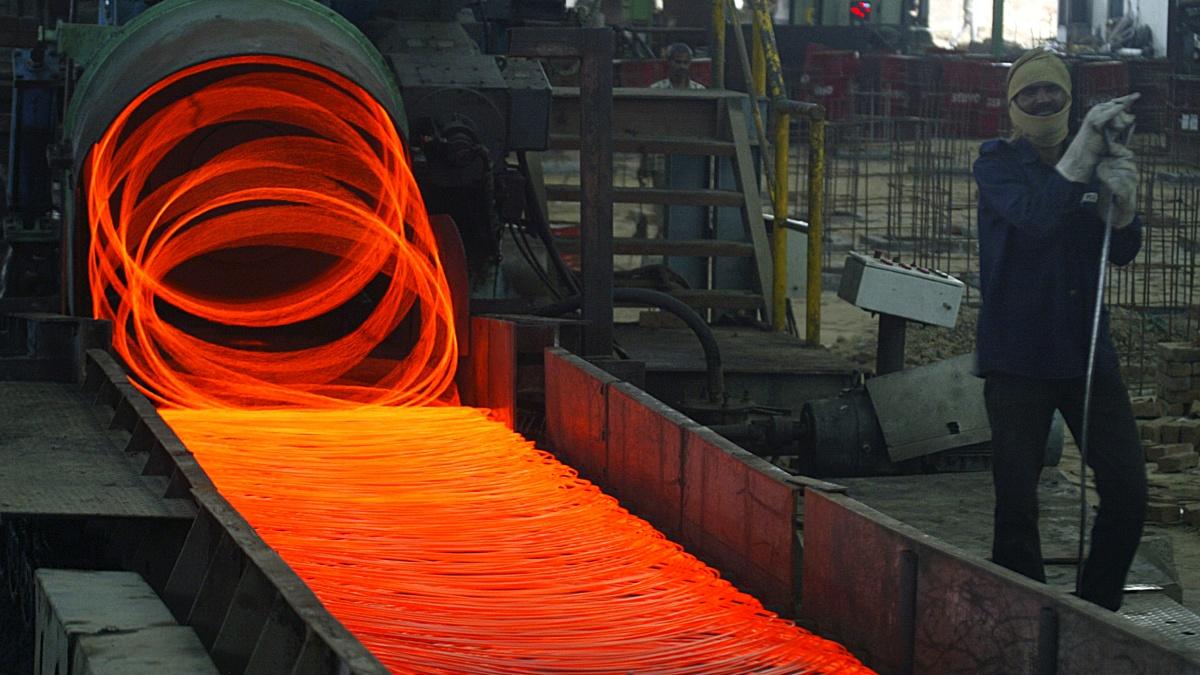‘The steel industry expects the government to decide on safeguard measures from dumping post-Budget’

IMAGE: A labourer works inside a steel factory in Kanpur.(Kindly note the image has only been published for representational purposes.) Photograph: Pawan Kumar/Reuters
India’s largest steel producer JSW Steel plans to continue with its Rs 65,000 crore capex within the timeline if margins are supportive.
In an audio interview company’s joint managing director and chief executive officer Jayant Acharya tells Ishita Ayan Dutt/Business Standard that the steel industry expects the government to take safeguard measures to curb dumping post-Budget. “A level playing field is very critical,” he emphasised.
Profitability in Q3FY25 was impacted on a year-on-year basis by lower steel prices. What is the outlook on steel price?
We increased prices in October when international prices had improved, especially in China.
However, it could not sustain and prices slipped back in November and December.
So while the raw material prices have also moderated somewhat, the impact in India especially on iron ore was not commensurate. Therefore, there was a drop in NSR (net sales realisation).
Still, we managed to offset the drop in prices sequentially due to better cost management and product mix and efficiencies.
Going forward in Q4, demand will continue to be strong. We expect the government to make a bigger capex spend in Q4. Raw material costs will go down further.
The JVML (JSW Vijayanagar Metallics Ltd) ramp-up has just started, so volumes will be stronger. And lower imports would support the sentiments on the prices.

Photograph: Kind courtesy, JSW Steel
You see imports coming down in the wake of a potential safeguard duty?
Yes. Prices in the international market continue to be weak and China is heavy on exports with last year at around 118 million tonnes (mt).
And the rest of the world continues to put up barriers to trade.
India has not done it and on the filing of an application by the industry, the trade body has initiated safeguard and anti-dumping investigations.
The government is cognizant of what is needed. So, we are looking for some steps from the government and maybe, we would see a response in February post-Budget.
Steel firms tried to increase prices in January but the market did not absorb it?
We increased prices in January a little. A part of it is absorbed towards the end of the month.
In long products also, the price acceptance in TMT is also there to some extent.
But in spite of a very good operational performance, both in production and sales, we are getting hit by dumping. A level playing field is very critical.
However, the stocks of imports have gone down to very low levels because now there is a hesitation to book.
A lot of people have lost money on the cargo booked about three months back.
That has resulted in a stand-off for imports because the ability to take those risks have gone down.

IMAGE: The logo of JSW on the company’s headquarters in Mumbai. Photograph: Danish Siddiqui/Reuters
In Q2, you had revised the capex for FY25 downwards from Rs 20,000 crore to Rs 16,000 to Rs 17,000 crore. Considering that the capex for nine months stood at Rs 10,937 crore, is there possibility of a further cut?
Any critical project which is important for us and nearing completion, we are trying to complete those.
The capex could be in the range of Rs 16,000 crore.
But if margins are still under pressure and we don’t see any positive steps on the trade, it restricts our ability to spend on capex because post-interest and depreciation and dividend and taxes you’re not really generating adequate margins to be put into capex. So we will then need to realign.
JSW Steel plans to invest about Rs 65,000 crore in three years. Any change in the timeline?
Our intention is to look at creating the capacity in India, because it is growing very well.
We don’t see the medium term story changing. So for us and the country’s self-reliance, the timing will be important.
In America, people are saying that structurally the steel industry is very critical.
Even in Europe, the steel industry is very critical from a strategic point of view.
Any kind of supply chain destruction can damage the capability of the country and they are taking steps to protect that.
So as a country, we need to take a call whether we should allow surplus capacities to be subsidised by other countries and allow it to be dumped into India and damage our industry, or not. I feel that the government will not allow this to happen.
So, if the margins are supportive, we will continue to spend as per our plan. If the margins come under pressure, then there may be some delays in some projects.

IMAGE: Labourers work inside a steel factory in Agartala.(Kindly note the image has only been published for representational purposes.) Photograph: Jayanta Dey/Reuters
What will be the impact of the Karnataka Mineral Rights and Mineral Bearing Land Tax Bill if it goes through?
The way it is envisaged, there is no mineral right tax on auctioned mines. There is a land tax.
Given the revenue the mining industry and the steel industry generates, I think any state government will be rational in their thought process of collecting tax so that they don’t kill the golden goose. And the absolute amount of tax revenues which they get from these sectors drop.
Beyond a point, if it becomes unsustainable, naturally, the industry will cut production and that will be far more damaging.

IMAGE: Jayant Acharya.
Photograph: Kind courtesy, JSW Steel
How do you see the Trump tariff policy playing out for steel trade?
Steel already has a very high level of safeguard and anti-dumping, so we anyway can’t export to the US.
That is not going to materially change. But for some countries there have been exemptions and it remains to be seen whether the new administration reviews it.
The trade flows can realign if there is any kind of change in those relaxations.
China is a factor which they are looking at, but its exports in steel to the US is extremely low.
I would say, more tariff actions may be expected on the automotive or engineering side, which China has used as a separate stream once steel could not be exported.
Feature Presentation: Rajesh Alva/Rediff.com




